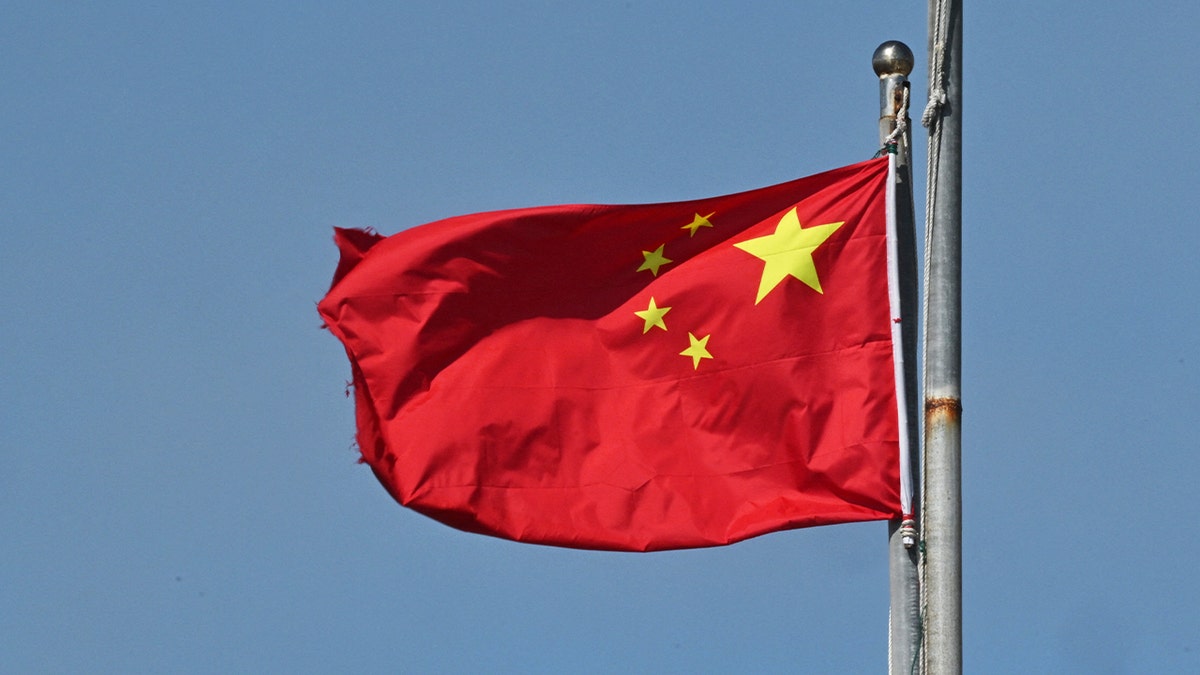INTERNACIONAL
House bipartisan bill directs NSA to create ‘AI security playbook’ amid Chinese tech race

NEWYou can now listen to Fox News articles!
FIRST ON FOX – Rep. Darin LaHood, R-Ind., is introducing a new bill Thursday imploring the National Security Administration (NSA) to develop an «AI security playbook» to stay ahead of threats from China and other foreign adversaries.
The bill, dubbed the «Advanced AI Security Readiness Act,» directs the NSA’s Artificial Intelligence Security Center to develop an «AI Security Playbook to address vulnerabilities, threat detection, cyber and physical security strategies, and contingency plans for highly sensitive AI systems.»
It is co-sponsored by House Select Committee on China Chairman Rep. John Moolenaar, R-Mich., Ranking Member Rep. Raja Krishnamoorthi, D-Ill., and Rep. Josh Gottheimer, D-N.J.
LaHood, who sits on the House Intelligence Committee and the House Select Committee on China, told Fox News Digital that the legislative proposal, if passed, would be the first time Congress codifies a «multi-prong approach to ensure that the U.S. remains ahead in the advanced technology race against the CCP.» He said the bill will improve export control mechanisms – including for chips and high capacity chip manufacturing – protect covered AI technologies with a focus on cybersecurity, and limit outbound investment to firms directly tied to the Chinese Community Party or China’s People’s Liberation Army.
CHINESE BIOWEAPON SMUGGLING CASE SHOWS US ‘TRAINS OUR ENEMIES,’ ‘LEARNED NOTHING’ FROM COVID: SECURITY EXPERT
Rep. Darin LaHood, R-Ill., leaves the House Republican Conference meeting at the Capitol Hill Club in Washington, D.C., on Tuesday, May 17, 2022. (Bill Clark/CQ-Roll Call, Inc via Getty Images)
«We start with the premise that China has a plan to replace the United States. And I don’t say that to scare people or my constituents, but they have a plan to replace the United States, and they’re working on it every single day. And that entails stealing data and infiltrating our systems,» LaHood told Fox News Digital. «AI is the next frontier on that. We lead the world in technology. We lead the world when it comes to AI. But what this bill will do will again make sure that things are done the right way and the correct way, and that we’re protecting our assets and promoting the current technology that we have in our country.»
LaHood pointed to evidence uncovered by the committee that he said shows the CCP’s DeepSeek used illegal distillation techniques to steal insights from U.S. AI models to accelerate their own technology development. He also pointed to how China allegedly smuggled AI chips through Singapore intermediaries to circumvent U.S. export controls on the technology.
«As we look at, ‘How do we win the strategic competition?’ I think most experts would say we’re ahead in AI right now against China, but not by much. It is a short lead,» LaHood told Fox News Digital.
He said he is confident the bill will put the U.S. «in the best position to protect our assets here and make sure that we’re not shipping things that shouldn’t go to AI that allow them to win the AI race in China.»
«Whoever wins this race in the future, it’s going to be critical to future warfare capabilities, to, obviously, cybersecurity,» LaHood continued. «And then, whoever wins the AI competition is going to yield really unwavering economic influence in the future. And so we’re aggressive in this bill in terms of targeting those areas where we need to protect our AI and our companies here in the United States, both on the commercial side and on the government side, to put us in the best position possible.»

National Security Agency Director Gen. Timothy Haugh speaks during a Senate Committee on Intelligence Hearing on March 25, 2025 in Washington, D.C. (Andrew Harnik/Getty Images)
The legislative proposal calls on the NSA to develop a playbook that identifies vulnerabilities in AI data centers and developers producing sensitive AI technologies with an emphasis on unique «threat vectors» that do not typically arise, or are less severe, in the context of conventional information technology systems.» The bill says the NSA must develop «core insights» in how advanced AI systems are being trained to identify potential interferences and must develop strategies to «detect, prevent and respond to cyber threats by threat actors targeting covered AI technologies.»
AMAZON ANNOUNCES $20B INVESTMENT IN RURAL PENNSYLVANIA FOR AI DATA CENTERS
The bill calls on the NSA to «identify levels of security, if any, that would require substantial involvement» by the U.S. government «in the development or oversight of highly advanced AI systems.» It cites a «hypothetical initiative to build covered AI technology systems in a highly secure government environment» with certain protocols in place, such as personnel vetting and security clearance processes, to mitigate «insider threats.»
Though not directly related, the legislation is being introduced a week after FBI Director Kash Patel sounded the alarm on how the CCP continues to deploy operatives and researchers to «infiltrate» U.S. institutions. Patel laid out the risk in announcing that two Chinese nationals were charged with smuggling a potential bioweapon into the U.S.
LaHood said that case further highlights «the level of penetration and sophistication that the CCP will engage in,» but he added that his bill focuses on putting a «protective layer» on U.S. AI tech and «restricting outbound investment to China.» He pointed to how the CCP also has bought up farmland around strategic U.S. national security locations, particularly in Montana, North Dakota and South Dakota.

Rep. Darin LaHood, R-Ind., said China’s goal is to replace the United States. (ADEK BERRY/AFP via Getty Images)
«If everything was an even playing field, and we were all abiding by the same rules and standards and ethical guidelines, I have no doubt the U.S. would win [the AI race], but China has a tendency and a history of playing by a different set of rules and standards,» LaHood said. «They cheat, they steal, they take our intellectual property. Not just my opinion, that’s been factually laid out, you know, in many different instances. And that’s the reason why we need to have a bill like this.»
The bill comes as the Trump administration has been pushing to bolster artificial intelligence infrastructure in the United States, and major tech companies, including Amazon, Nvidia, Meta, OpenAI, Oracle and others, have made major investments in constructing AI-focused data centers and enhancing U.S. cloud computing. Last week, Amazon announced a $20 billion investment in constructing AI data centers in rural Pennsylvania. It followed a similar $10 billion investment in North Carolina.
CLICK HERE TO GET THE FOX NEWS APP
In late May, the NSA’s Artificial Intelligence Security Center released «joint guidance» on the «risks and best practices in AI data security.» The recommendations include implementing methods to secure the data used in AI-based systems, «such as employing digital signatures to authenticate trusted revisions, tracking data provenance, and leveraging trusted infrastructure.» The center said its guidance is «critically relevant for organizations – especially system owners and administrators within the Department of Defense, National Security Systems, and the Defense Industrial Base – that already use AI systems in their day-to-day operations and those that are seeking to integrate AI into their infrastructure.»
INTERNACIONAL
Ante la corrupción en el Ejército, el régimen de Xi Jinping recurre a la propaganda para contener la descomposición interna

El Ejército Popular de Liberación (EPL) de China intensificó esta semana su campaña ideológica interna con la publicación de un editorial que insta a los cuadros políticos militares a “decir la verdad” y “enfrentar los problemas de frente”. El mensaje, difundido en el Diario del EPL, órgano oficial de las Fuerzas Armadas, forma parte de una estrategia propagandística que busca contener el desgaste institucional tras los múltiples escándalos de corrupción que han sacudido a la cúpula militar.
“El ocultamiento de los problemas o el maquillaje de la realidad reflejan un carácter partidario impuro y motivaciones egoístas”, advierte el texto, publicado sin firma individual, pero atribuido a un comentarista oficial del diario. El artículo exige a los funcionarios políticos del Ejército —encargados de aplicar la línea ideológica del Partido Comunista— actuar con “moralidad e integridad” en un contexto marcado por purgas internas, ausencia de información y la caída de varios altos mandos por corrupción.
Los cuadros, sostiene el editorial, deben ser “luchadores, no caballeros”, una formulación que refuerza la visión autoritaria del régimen sobre el papel del liderazgo militar. Se invoca además la figura de Mao Zedong y otros líderes revolucionarios para legitimar la necesidad de “predicar con el ejemplo” en medio de lo que el propio texto califica como “riesgos superpuestos” para el Ejército.
La publicación llega apenas dos días después de que la Comisión Militar Central (CMC), máximo órgano castrense de China, emitiera nuevas directrices para reconstruir la credibilidad de las Fuerzas Armadas. El documento, también difundido por el Diario del EPL, establece “líneas rojas políticas” y limitaciones en las interacciones sociales de los oficiales, con el objetivo explícito de frenar redes de favores y tráfico de influencias.

Aunque no se mencionan nombres, ambos textos aparecen en medio del silencio oficial sobre el paradero y la situación legal de figuras como el general He Weidong, uno de los oficiales de más alto rango que ha desaparecido del espacio público sin explicación. Tampoco se ha informado sobre las causas reales que llevaron a la caída de los dos últimos ministros de Defensa, reemplazados en medio de investigaciones internas cuya existencia no ha sido formalmente reconocida por las autoridades.
La falta de transparencia, sumada a la sustitución del debido proceso por campañas ideológicas, ha sido una constante en la gestión del Ejército bajo el liderazgo de Xi Jinping. En lugar de una rendición de cuentas abierta, el régimen ha optado por reforzar el control político mediante discursos de moral partidaria, publicaciones anónimas y referencias simbólicas a la historia del Partido.
La coincidencia entre el tono del editorial y las nuevas normas disciplinarias revela un patrón habitual en el sistema de propaganda del Partido Comunista Chino: el uso de medios oficiales para ejercer presión indirecta, consolidar el poder de la jerarquía política y silenciar cualquier forma de disidencia dentro del aparato militar.

Lejos de ser un gesto de reforma, el llamado a la “honradez” y a la “verdad” se produce en un entorno donde la verdad institucional se decide desde arriba, sin mecanismos independientes ni espacio para el escrutinio público. En ese contexto, las apelaciones a la lealtad, la disciplina y la “pureza ideológica” funcionan como herramientas de blindaje para un régimen que prioriza la estabilidad política frente a la rendición de cuentas.
(Con información de EFE)
INTERNACIONAL
ICE chief warns AI technology could lead to safety risks for agents: ‘Fringe organizations’

NEWYou can now listen to Fox News articles!
Far-left organizations could be using artificial intelligence and other technology to reveal the identity of Immigration and Customs Enforcement agents, acting ICE Director Todd Lyons told Fox News Digital in an interview.
Lyons’ remarks come as Democrats in Congress recently proposed the VISIBLE Act, which would require clear identification of ICE agents and prevent masking of federal immigration authorities in public-facing circumstances.
«If legislation passes to try to unmask ICE agents, they are not allowed to wear them, it runs the risk of agitators, different groups, you know, these fringe organizations using reverse technology, AI, to try to dox their families, try to get their identity, their home addresses,» Lyons said of the reaction from agents on the ground. «We’ve heard elected officials say there shouldn’t be any rest for ICE agents or their families.
«So they’re definitely concerned about that. They’re also concerned about their own well-being when they go out to effectuate these arrests because now we have to send more officers out into the communities because where we can send four or five to make arrests in the past, now we had to send up to eight or 10 just to protect the four that are making the arrests of one individual.»
MASSACHUSETTS BILL WOULD FORCE ICE AGENTS TO UNMASK
Residents surround federal and Border Patrol agents after an immigrant raid on Atlantic Boulevard in Bell, Calif., June 19, 2025. (Genaro Molina/Los Angeles Times via Getty Images)
He added that the safety risk does require more resources when conducting arrests. When ICE was conducting operations in Los Angeles in June, President Donald Trump sent in the California National Guard to the city with the goal of protecting agents and quelling riots. That move was legally challenged by California Gov. Gavin Newsom.
«The Marines are withdrawing. This is another win for Los Angeles,» Los Angeles Mayor Karen Bass posted to X Monday.
ICE agents have faced an 830% increase in assaults since last year, according to DHS. However, proponents of the VISIBLE Act have said it’s nessescary for accountability.
«For weeks, Americans have watched federal agents with no visible identification detain people off the streets and instill fear in communities across the country,» Sen. Cory Booker, D-New Jersey, said in a statement July 8.
«Reports of individuals impersonating ICE officers have only increased the risk to public and officer safety. The lack of visible identification and uniform standards for immigration enforcement officers has created confusion, stoked fear and undermined public trust in law enforcement.»
DHS FIRES BACK AT DEMOCRATS FOR ‘BEYOND THE PALE’ RHETORIC AS ICE AGENTS FACE WAVE OF VIOLENT THREATS

Ten suspects were charged with attempted murder of a federal officer in an alleged July 4, 2025, ambush attack on the Prairieland Detention Center in Alvarado, Texas. (Johnson County Sheriff’s Office)
«Assault could be anything from resisting arrest where they assault the officers, whether they’re kicking, grabbing officers. It could be something as dramatic as what we saw in Alvarado, Texas, where we had local police ambushed with firearms,» Lyons said.
«You saw it during the recent marijuana grow farm raid operation, where we had an individual firing a handgun at ICE officers, rocks thrown at them. It’s everything from verbal assault to physical assault to threats of bodily harm, deadly force. It’s run the whole gamut.»
Authorities have charged 12 people in an alleged anti-ICE attack at the Prairieland Detention Center on Independence Day, including ten for alleged attempted murder of federal officers and gun offenses. Reports have indicated that some planning occurred through a Signal group chat, and Lyons noted that this was likely planned by the Dallas area activists for some time.
CLICK HERE FOR MORE IMMIGRATION COVERAGE

«Death to ICE» is written on a garbage cart after multiple detentions by Immigration and Customs Enforcement in downtown Los Angeles June 6, 2025. (Reuters/Daniel Cole)
«Well, the FBI is doing a great job investigating it as a whole organized event,» Lyons said. «So, you saw where it was actually organized with social media, where you have organized people in a typical L-shaped ambush where you had escape vehicles. So, without getting too much into what the Department of Justice and the FBI do, there is definitely evidence that this was planned for a while, and it wasn’t just a spur-of-the-moment protest. These were agitators focused on assaulting law enforcement officers and assaulting ICE.»
In terms of facing these coordinated efforts, the director said it’s a matter of planning and looking at the information available before conducting an operation.
ACTING ICE DIRECTOR CALLS MAYOR WU’S NEO-NAZI COMPARISON ‘DISGUSTING’ AMID INCREASE IN AGENT ASSAULTS

U.S. Immigration and Customs Enforcement agents look over lists of names and their hearing times and locations inside the Federal Plaza courthouse before making arrests June 27, 2025, in New York. (Bryan R. Smith/AFP via Getty Images)
«What we’re doing is definitely working with all of our federal partners as well as the state partners that do coordinate with us what we use and all the intelligence that we have at our disposal to go ahead and try to find out as much about these groups and as much as about these organizations and these planned events that we can to let our officers and agents know in the field prior to going out,» Lyons said.
CLICK HERE TO GET THE FOX NEWS APP
«So, we wanna make sure that officers are fully aware of what the situations they’re getting into, but we are also making sure that we’re properly staffed when we go out.»
In addition, he said recent funding from the «big, beautiful bill» would be to try to bring back personnel that «retired early» under the Biden administration and look at veterans and officials at the local and state levels who «already have the training» to «beef up» staffing at the agency.
INTERNACIONAL
Estados Unidos ordenó incautar un buque pesquero chino por esclavitud y violaciones a los derechos humanos: hasta hace un mes operó frente al Mar Argentino

El gobierno de Estados Unidos ordenó la incautación de todos los productos de mar capturados por el buque pesquero Zhen Fa 7, de bandera china, por graves violaciones a los derechos humanos.
La embarcación, que operó hasta mediados de junio frente a la Patagonia argentina, fue acusada de prácticas que incluyen esclavitud, violencia sexual, condiciones laborales inhumanas y retención de documentos, según denunció el Departamento de Seguridad Nacional estadounidense.
La medida fue emitida por la Unidad de Aduanas y Protección Fronteriza (CBP), que basó su decisión en indicadores de trabajo forzoso identificados por la Organización Internacional del Trabajo (OIT). El caso fue difundido por el Círculo de Políticas Ambientales, una organización que monitorea la pesca ilegal en América del Sur.
«Zhen Fa 7 se benefició de menores costos laborales, produjo bienes por debajo del valor de mercado, perjudicó a las empresas estadounidenses y obtuvo ganancias injustamente», explicó el organismo en su resolución oficial publicada en su sitio web.
Durante más de una década, el buque operó en el Pacífico y Atlántico sur, con una fuerte presencia frente a las costas de Ecuador, Perú, Chile y Argentina. En su paso más reciente por Sudamérica, estuvo operativo frente al Mar Argentino hasta el 16 de junio de 2025 y utilizó el Puerto de Montevideo, Uruguay, como base logística.
No es la primera vez que el Zhen Fa 7 queda en la mira por abusos: en 2021 abandonó a un tripulante en estado crítico en Montevideo. El joven, de nacionalidad indonesia, falleció poco después en un hospital local. Las autoridades uruguayas nunca registraron oficialmente el ingreso del buque tanquero que lo desembarcó.
En marzo de este año, se detectó que el Zhen Fa 7 ingresó hasta 180 millas dentro de la Zona Económica Exclusiva (ZEE) argentina, aproximándose peligrosamente a las costas del Chubut, frente al Golfo San Jorge. Lo hizo acompañado por una flota de al menos 150 pesqueros chinos, bajo el argumento de buscar refugio por tormentas.
En enero, la provincia de Santa Cruz firmó un acuerdo con empresas pesqueras chinas, muchas de las cuales tienen antecedentes similares de abuso y pesca ilegal. El informe alerta que estas flotas operan gracias a subsidios estatales y explotación sistemática de sus tripulaciones.
La pesca ilegal, no declarada y no reglamentada (INDNR) tiene consecuencias devastadoras: afecta ecosistemas marinos, la actividad pesquera legal y también genera un impacto económico y social directo en los países ribereños. A pesar de eso, Argentina todavía no ratificó dos acuerdos internacionales clave (uno de la OMC y otro de la OMI) que podrían contribuir a ponerle freno a estos abusos, a pesar de haber sido aprobados por el Congreso.
Este martes, Argentina depositó su instrumento de ratificación del Acuerdo sobre Subvenciones a la Pesca de la Organización Mundial del Comercio, que busca limitar el accionar de las flotas que realizan pesca ilegal y no reglamentada en los mares del mundo. Había sido aprobado por el Congreso en octubre del año pasado.
Se trata de un acuerdo fundamental para luchar contra la depredación pesquera que ocurre en el Atlántico Sur, ya que impacta directamente en el financiamiento estatal que recibe la flota extranjera que realiza pesca destructiva, ilegal y no reglamentada.
El acuerdo, que demandó más de 20 años de negociación, constituye uno de los principales logros alcanzados en la OMC desde su creación, puesto que por primera vez se establece la restricción de los subsidios que afectan negativamente al comercio y a la conservación de los recursos pesqueros y se prohíbe las subvenciones que contribuyen a la pesca ilegal, no declarada y no reglamentada (INDNR), a la pesca de poblaciones ya sobreexplotadas y a la pesca en alta mar no reglamentada.
Según había anunciado el Gobierno argentino en octubre pasado, el acuerdo tiene implicancias de enorme relevancia para el país, dado su gran litoral marítimo y la importancia de los recursos pesqueros..
En particular, se espera que contribuya a disminuir la presión pesquera en el área adyacente a la Zona Económica Exclusiva Argentina, coloquialmente referida como «milla 201», ya que al limitar la posibilidad de que los países recurran a subsidios para mantener artificialmente la actividad de sus flotas, el acuerdo contribuirá a la protección de los recursos pesqueros en las aguas adyacentes a la jurisdicción nacional, limitará las capacidades de grandes flotas que pescan a distancia y complementará los esfuerzos de patrullaje de las autoridades nacionales sobre el terreno.
Con la aprobación del Congreso, el Gobierno estará ya en condiciones de sumarse a los más de 80 países que han presentado a la OMC su instrumento de ratificación.
China,Estados Unidos,pesca ilegal,Derechos Humanos,Últimas Noticias

 POLITICA2 días ago
POLITICA2 días agoExpulsada del Gobierno, Victoria Villarruel empieza a tomar distancia, pero no tiene proyecto político para este año

 POLITICA2 días ago
POLITICA2 días agoLa CGT evalúa adelantar a octubre el recambio de sus autoridades y define una movilización contra Milei

 POLITICA1 día ago
POLITICA1 día ago🗳️ El chamuyo de las elecciones en la Provincia: se postulan, pero no a asumen
























